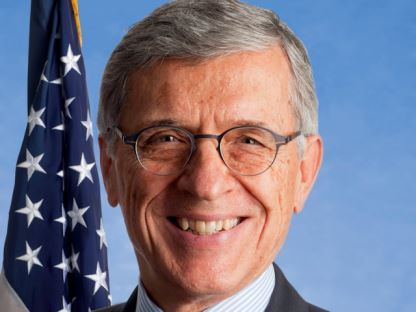Wheeler Signals JSA Rule Could Return
The smarter way to stay on top of the multichannel video marketplace. Sign up below.
You are now subscribed
Your newsletter sign-up was successful

RELATED:D.C. Weighs In on FCC JSA Smackdown
FCC chairman Tom Wheeler said Wednesday (May 25) that he was still committed to getting a quadrennial media ownership review draft out the door by the end of June -- "I intend to meet that goal," he said -- and that it could provide the support for restoring its decision to make most TV joint sales agreements attributable as ownership interests.
That came in response to the U.S. Court of Appeals for Third Circuit's decision vacating the FCC's TV JSA rule tightening, a ruling based on the lack of reasoned analysis of the underlying media ownership rules, which the court criticized the FCC for delaying.
The court "reminded" the FCC of its obligation to complete the Congressionally-ordered quadrennial review, but did not give it a deadline. (One judge, Anthony Scirica, said he would have ordered a resolution.)
The court displayed its impatience with the FCC's delay of that review, and the 12-year saga of the legal challenge to the rules. But it also said it was not ruling on the underlying JSA rule, only on the FCC's failure to justify it given that it had yet to review the underlying media ownership rules on which it was based via a quadrennial review.
"The court didn't say the JSA rule doesn't make sense, Wheeler said . "They said it needs to be based on rules that themselves haven't been reviewed. So, you review those rules [which he said will be completed, at least in draft form, by June 30] and that sets up a predicate on any decision on JSAs."
An FCC official added that the court had ruled the FCC had erred procedurally by changing its JSA attribution rules cart before the quadrennial review horse, which would be finding that the underlying rules were still in the public interest.
The smarter way to stay on top of the multichannel video marketplace. Sign up below.
But he said nothing in that ruling belies the FCC conclusion that JSAs (of at least 15% of sales) are the functional equivalent of ownership.
On the larger issue of the quadrennial, the court said the FCC needed to get the quadrennial done ASAP, based on data to buttress it.
Wheeler was asked at a press conference following the FCC's public meeting whether that data would be irrelevant given the changes to the TV marketplace being wrought by the spectrum auction.
Wheeler said he would use the data he had, but that it was a "Very legitimate point," but that it did not modify the commitment to have a proposal by June.
Wheeler signaled the blame for the quadrennial delay needed to be spread around. "This has been a dozen years in coming," he said, "across both Republican and Democratic Administrations."
An FCC official said that the FCC was still studying the decision at press time. He conceded the court had expressed frustration with the FCC's delay in completing the 2010 and 2014 quadrennial reviews, but pointed out the court rejected what he called broadcasters attack on all the rules.
He pointed out that the court rejected broadcasters call to throw out all the ownership rules given the lack of review. The court had said that request was "the administrative law equivalent of burning down the house to roast the pig." He also said the trusted the chairman would follow through with circulating the item with the expectation of finalizing it by year's end.
The official said that the court's conclusion that the FCC had unduly delayed coming up with a definition of "designated entity" -- central to its ability to promote diverse media ownership without running afoul of affirmative action court rulings -- was already being addressed through prompt action and resolution in "the near future."
The court required the FCC and parties pushing for the definition, which includes the United Church of Christ Office of Communications, to engage in mediation and, within 60 days, come up with a timetable for that resolution or the court would impose one.
Contributing editor John Eggerton has been an editor and/or writer on media regulation, legislation and policy for over four decades, including covering the FCC, FTC, Congress, the major media trade associations, and the federal courts. In addition to Multichannel News and Broadcasting + Cable, his work has appeared in Radio World, TV Technology, TV Fax, This Week in Consumer Electronics, Variety and the Encyclopedia Britannica.

